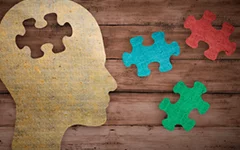
Magnesium is a life-giving nutrient and important for many functions within our cells. Our ancestors had plenty of magnesium in their diet which was rich in organ meats and vegetables from mineral-rich soil. Today our soils are depleted of minerals due to modern farming practices. Even organic produce has fewer minerals than the produce our ancestors consumed. Therefore we are not getting adequate magnesium from the foods we are eating, even if we are trying to eat an ancestral type diet.
How Does Magnesium Work in the Brain?
Magnesium is a “gatekeeper” for calcium. It allows for calcium to be excreted from cells as needed, in response to various stressors. In Dr. Emily Deans’ piece, Magnesium and The Brain: The Original Chill Pill, Dr. Deans states:
Magnesium hangs out in the synapse between two neurons along with calcium and glutamate. If you recall, calcium and glutamate are excitatory and in excess, toxic. They activate the NMDA receptor. Magnesium can sit on the NMDA receptor without activating it, like a guard at the gate. Therefore, if we are deficient in magnesium, there’s no guard. Calcium and glutamate can activate the receptor like there is no tomorrow. In the long term, this damages the neurons, eventually leading to cell death. In the brain, that is not an easy situation to reverse or remedy.
In a nutshell, when we are stressed, calcium triggers that fight or flight response that we experience, as well as the subsequent stress response in the body. Magnesium is like the cowboy lassoing the wild horse, and reigns calcium back to where it needs to be, allowing the brain and body to calm down and relax.
Which Came First, Stress or Magnesium Deficiency?
Some of the symptoms one may experience with magnesium deficiency include anxiety, insomnia, moodiness, irritability, racing heart, migraines, and noise sensitivity. Depressed mood and anxiety being on the forefront of it all. When we are in chronic stress, our magnesium gets depleted even more. Therefore, a magnesium deficiency can lead to stress-related issues. However, stress-related issues can also cause a magnesium deficiency. This can become a vicious cycle for many!
There are some magnesium rich foods we can include in our diet, such as leafy greens, nuts and seeds, and even avocados. However, even with the healthiest diet most of us are still not getting adequate amounts of magnesium. By supplementing with a quality magnesium product, people often find they get better quality sleep, and relief from some of their anxiety and stress related symptoms.
About the Author:
Kathryn is a functional nutritional therapist, author, editor, and mama of two boys. She enjoys spending her free time out in nature-hiking and fishing. You can find her at www.primalmusings.com and her book “Forties on Fire” can be found on Amazon.
